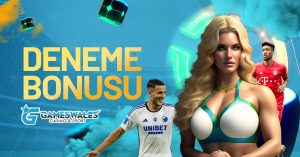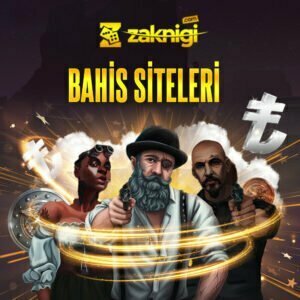Deneme bonusu veren siteler, oyuncuların bahis sitelerinden beklentisi yüksek kazanç elde etme fırsatı sağlamalarıdır. Deneme bonusu veren siteler beklentileri daha ilk aşamadan karşılamak amacıyla imkan tanır. Bu fırsatı değerlendirmek için ise üyelik gerçekleştirmek gerekir.
Tüm sitelere üyelik işlemi ücretsizdir. Kayıt işlemlerini sağlayan oyuncular üyelik aktivasyonu sonrasında site tarafından belirlenmiş olan deneme bonusu için talepte bulunabilmektedir. Talep genel olarak çoğu sitede canlı destek hattı üzerinden sağlanmaktadır. Bazı sitelerde ise otomatik tanımlama yapılmaktadır.

Deneme bonusu veren siteler arasında sunulan bonus miktarı değişkenlik göstermektedir. Ayrıca bonusun kullanım alanları da değişebilmektedir. Belirli sitelerde bonus sadece bahis oyunları için sunulurken, bazı sitelerde ise slot oyunlarında geçerli bonus verilmektedir. Deneme bonusu konusunda iki alternatif seçeneği sunmakta olan sitelerde bulunmaktadır.
Site tercihi aşamasında oynayacağınız oyuna bağlı promosyon sunan siteyi başta belirlemeniz son derece önemlidir. Bu sayede üyelik kaydı oluşturmadan, bilgi paylaşmadan doğru seçim yapıp yapmadığınızın sonradan farkına varma durumuyla karşılaşmazsınız.
” Deneme bonusu veren siteler ” güncel listesi şu şekildedir;
- Paribahis ( 300 & Bedava Freespin )
- Bahsegel ( 250 & Bedava Freespin )
- Bahiscom ( 300 TL Deneme Bonusu )
- Sahabet ( 111 TL Deneme Bonusu )
- Restbet ( 300 TL Deneme Bonusu )
- ikimisli ( 200 TL Deneme Bonusu )
- Makrajbet ( 100 TL Deneme Bonusu )
- Hızlıbahis( 150 TL Deneme Bonusu )
- Mariobet ( 200 TL Deneme Bonusu )
Sonuç olarak, deneme bonusu veren siteler üyelerin bahisleri denemelerine veya daha fazla para kazanmalarına yardımcı olabilir. Ancak, bonusların kullanımı konusunda dikkatli olunmalıdır. Ayrıca, bonusları kullanmak için üyelerin bonusun koşullarını ve şartlarını önceden okumaları gerekebilir.
Deneme Bonusu Veren Siteler 2024
Deneme bonusu veren siteler 2024 ve 2025 yılı bonusları oldukça merak edilen konulardan biridir. 2024 yılının sonlarında güncellenmeye başlayan deneme bonusu tutarları özellikle yeni üyeler için büyük avantaj olurken, siteler içinde yeni kullanıcı edinmek konusunda büyük bir ivme sağlamaktadır.
2024 yılında deneme bonusu ve diğer bonuslar konusunda yapılacak güncellemeler kullanıcıların kazançlarını elbette ki yükseltecektir. Bu sayede oyuncular daha fazla kazanmak için daha fazla oyunlara katılabilecektir.
” Deneme bonusu veren siteler 2024 ” şu şekilde sıralanabilir;
- Paribahis (250 TL Deneme Bonusu)
- Bahsegel (250 TL Deneme Bonusu)
- Bahiscom (150 TL Deneme Bonusu)
- Sahabet (111 TL Deneme Bonusu)
- Restbet (50 TL Deneme Bonusu)
- ikimisli (100 TL Deneme Bonusu)
- Makrajbet (100 TL Deneme Bonusu)
- Hızlıbahis (150 TL Deneme Bonusu)
- Betkom (150 TL Deneme Bonusu)
- Supertoto (250 TL Deneme Bonusu)
İlk üyelik bonusu, Twitter bonusu, yatırım bonusu ve kayıp bonusu gibi birçok bonus tutarından yapılacak olan güncelleme yeni yıldı oyuncuların kazanç miktarını arttırmasına olanak tanıyacaktır.Deneme bonusu veren siteler 2024 ve 2025 yılı bonusları listesinde birçok firmayı bir arada görebilirsiniz.
Bu firmalardan güvenli olanı ve aynı zamanda bonus fırsatları açısından en avantajlı görüneni tercih ederseniz hiçbir sorun yaşamadan oyun oynayabilir ve kazancınızı bonus sayesinde katlayabilirsiniz.
Oyuncuların ilk kez üyelik sağladıkları veya sağlayacakları sitenin bonus fırsatlarını işlemleri tamamlamadan önce gözden geçirmesi ve sonrasında kayıt sağlayarak bonus talep etmesi önemli bir ayrıntıdır. Bonus talebi konusunda canlı destek hattından yardım alınabilmektedir.
Deneme Bonusu
Deneme Bonusu yabancı bahis sitesinde kazançlı oyun oynamak için birçok olanak sağlanır. Yüksek oranlar, canlı casino oyunları oynayabilme, şansa dayalı oyunlar ve elbette ki promosyonlar kazancı olumlu yönde etkilemektedir.

Deneme bonusu hiç şüphesiz bu sitelerin sunduğu en büyük olanaktır. Bu fırsatı değerlendirmek isteyen oyuncuların ise sadece yapması gereken üyelik sağlamaktır. Üyelik için herhangi bir ücret talep edilmemektedir. Aranan tek şart oyuncunun 18 yaşını doldurmuş olarak ve kendi kişisel bilgileri ile üyelik işlemlerini sağlamasıdır. Bir diğer önemli detay ise o siteye daha önceden hiçbir şekilde üyelik sağlamamış olmaktır.
Deneme bonusu miktarı her site için farklılık gösterebilir. Bazı siteler birden fazla seçeneği olan deneme bonusları sunar. Bahis oyunlarında geçerli olan TL bazında deneme bonusları olduğu gibi, casino oyunlarında geçerli olan bedava freespin gibi bonuslar da bulunmaktadır. Bu seçimi kullanıcı, üyelik işleminden sonra canlı destek hattına bağlanarak kendisi sağlar. Ne türde hangi oyunda kullanılmak üzere bonus istendiği belirtildikten sonra, kullanıcının hesabına bonus tanımlaması yapılmaktadır. Bu süreç, kullanıcıya daha kazançlı ve keyifli bir oyun deneyimi sunmak adına önemlidir
Bonus Veren Siteler
Bonus veren isteler olarak listelenen firmalar genelde en kazançlı ve aynı zamanda güvenli adreslerden oluşur. Buradaki siteler arasından bilindik firmaları tercih etmek sorun yaşamadan hizmet almak adına önemlidir.Ayrıca bonus veren siteler sağladıkları bonus tutarları, bonusun geniş bir oyun yelpazesinde kullanılabiliyor olması ve en önemlisi de çevrim ve çekim şartları konusunda sıralanmaktadır.Çevrim şartı olmadan bonus alabilmek büyük ayrıcalıktır. Zira elde edilen kazancı çevrim aşamasında kaybeden oyuncu sayısı azımsanmayacak kadar yüksektir.

Ayrıca bonus ile elde edilen kazancın ne kadarının çekilebileceğine dair belirlenmiş maksimum limitin yüksek olması oyuncu açısından küçümsenmeyecek kadar önemli bir detaydır.Tüm bu bilgiler ışığında bonus veren siteler oyuncu için her daim avantaj anlamını taşır.
Bu avantajı doğru kullanmak ise tercih öncesinde araştırma yapmaya bağlıdır. Sitenin güvenilir olmasının ardından bonusun talebi, tanımlanması, bonus kazancının ödenmesi konusunda olumlu sonuçlar alınan sitede üyelik sağlamak kazançlı olacaktır.
Kayıt sonrasında bonus talepleri genel olarak canlı destekten yapılmaktadır.Bazı sitelerde ise kayıp ve yatırım bonusları için talepler yatırım esnasında otomatik seçim ile gerçekleştirilmektedir. Yine bakiyenin sıfırlanması durumunda kayıp bonusu al gibi butonlarla hızlı bonus talebi ve tanımlama yapılabilmektedir.
Yatırım Şartsız Bonus veren siteler şu şekildedir;
| Bahiscom | 250 TL Deneme Bonusu | Yatırım Şartı Yok |
| Makraj | 100 TL Deneme Bonusu | Yatırım Şartı Yok |
| Betorspin | 100 TL Deneme Bonusu | Yatırım Şartı Yok |
| Tarafbet | 150 TL Deneme Bonusu | Yatırım Şartı Yok |
| Mariobet | 100 TL Deneme Bonusu | Yatırım Şartı Yok |
| Betist | 100 TL Deneme Bonusu | Yatırım Şartı Yok |
| Betkolik | 150 TL Deneme Bonusu | Yatırım Şartı Yok |
| Onwin | 101 TL Deneme Bonusu | Yatırım Şartı Yok |
Bahis Siteleri
Bahis siteleri Online oyun oynamak ve kazanç sağlamak isteyen her oyuncu için doğru adres bahis siteleri olmaktadır. Özellikle yabancı bahis siteleri oyuncular açısından kazanç konusunda büyük imkanlar tanımaktadır.

Bu imkanları değerlendirmek isteyen oyuncular ise bahis siteleri arasından güvenilir ve kazançlı olan firmaları seçmektedir. Zira bahis siteleri kendi aralarında öncelikle güvenilir bahis siteleri olarak ayrılmakta ve listelenmektedir. Buradaki güvenilirlik kriteri hizmet kalitesi, ödeme işlemlerindeki sorunsuzluk ve kullanıcının karşılaştığı sorunlar karşısında hızlı çözüm sağlanması olmaktadır. Ayrıca site hakkındaki kullanıcı yorumları da bir sitenin ne denli güvenilir olduğunu kanıtlayan gerçek deneyimleri ortaya çıkartmaktadır.
Ayrıca ülkemizde bilindiği gibi bahis siteleri BTK kurumu tarafından erişim engeline maruz kalmaktadır. Bu nedenle sürekli olarak hizmet verebilmek adına adres değiştirmektedir. Bu işlemi hızlı ve her engelleme sonrasında istikrarlı şekilde sağlayan siteler kendilerine güvenilir bahis siteleri arasında yer bulmaktadır.
Güvenli bir sitenin sağladığı oranlar ve bonuslar da kullanıcı açısından yeterli olması halinde oyuncular bu tür sitelerde uzun süreli oyun oynamaya devam etmektedir.
Bahis, casino, canlı casino, slot ve daha birçok online oyun için deneme bonusu ve bedava bonus fırsatlarını değerlendirerek site kalitesinin ne denli yüksek olduğunu birebir inceleyebilir, sürekli hizmet alabileceğiniz bir siteye üye olup olmadığınıza kendiniz karar verebilirsiniz.
Online olarak bahis sitelerini sizlere şu şekilde sıralayabiliriz;
- Betkom
- Betmario
- Bettilt
- Marsbahis
- Bahiscom
- Kralbet
- Tarafbet
- Best10
- Betine
- Betist
- Betlike
Yabancı bahis siteleri deneme bonusu veren siteler arasında güvenli ve en yüksek tutardaki bonusu sağlayan firmalara dair bilgileri sitemizde de inceleyebilir, sitelerin giriş bilgilerine dair de en yeni giriş adresi bilgisini yine buradan takip edebilirsiniz.
 Deneme Bonusu Veren siteler
Deneme Bonusu Veren siteler
